高中英语必修一Unit-2知识点
新人教版(2019)高中英语必修一Unit 2 重点单词详解(超级详细)
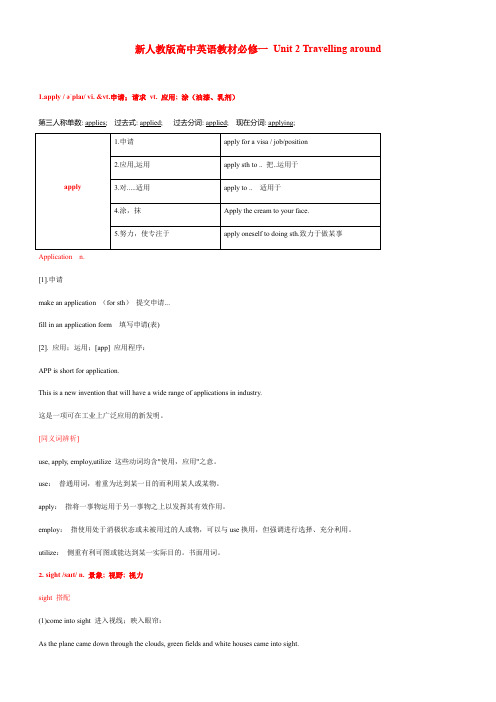
新人教版高中英语教材必修一Unit 2 Travelling around 1.apply / əˈplaɪ/ vi. &vt.申请;请求vt. 应用; 涂(油漆、乳剂)Application n.[1].申请make an application (for sth)提交申请...fill in an application form 填写申请(表)[2]. 应用;运用;[app] 应用程序:APP is short for application.This is a new invention that will have a wide range of applications in industry.这是一项可在工业上广泛应用的新发明。
[同义词辨析]use, apply, employ,utilize 这些动词均含"使用,应用"之意。
use:普通用词,着重为达到某一目的而利用某人或某物。
apply:指将一事物运用于另一事物之上以发挥其有效作用。
employ:指使用处于消极状态或未被用过的人或物,可以与use换用,但强调进行选择、充分利用。
utilize:侧重有利可图或能达到某一实际目的。
书面用词。
2.sight /saɪt/ n. 景象; 视野; 视力sight 搭配(1)come into sight 进入视线;映入眼帘:As the plane came down through the clouds, green fields and white houses came into sight.(2)catch sight of 看见;发现:Suddenly, I caught sight of my English teacher in the crowd.(3)lose sight of 看不见;忽略;I lost sight of him in the crowd.(4)in sight 看得见,在视线内(5)out of sight 看不见(6)at first sight 一见(就);乍一看:fall in love with sb at first sightAt first sight, there is nothing special about the watch, but in fact it is a mobile phone.(7)at the sight of 一看见:Some people will faint at the sight of blood.(8)(谚语)眼不见,心不想out of sight, out of mind3.amaze v. 使惊奇/惊愕be amazed at/by/that.. 对....感到惊奇be amazed to doamazing / əˈmeɪzɪŋ / adj. 令人惊奇的;令人惊喜的amazing sightsamazed / əˈmeɪzd / adj. (人感到)惊奇的;惊喜的amazement n. to one's amazement 令某人惊讶的[同义词辨析]surprise, amaze, astonish, stun这些动词均含"使惊愕,使惊讶,使惊奇"之意。
人教版高二英语必修一unit2知识点

人教版高二英语必修一unit2知识点Unit 2: English in ActionIn this article, we will explore the key knowledge points of Unit 2 in the People's Education Press (PEP) textbook for Grade 11 English.1. Reading SkillsUnit 2 focuses on improving reading skills through various activities. It emphasizes the ability to read and comprehend different types of texts, including narratives, advertisements, and news articles. Students are encouraged to analyze the main ideas, supporting details, and author's purpose in these texts.2. Grammar and VocabularyThis unit introduces several important grammar points and vocabulary related to the topic of travel. Students learn about verb patterns, such as the use of infinitives and gerunds. They also study adverbs of frequency and time expressions to discuss past and future events. Additionally, this unit expands their travel-related vocabulary, such as words associated with transportation, accommodation, and tourist attractions.3. Listening and SpeakingUnit 2 aims to enhance students' listening and speaking skills by engaging them in various activities related to travel. Students practice listening to conversations, interviews, and speeches to improve their ability to understand spoken English. They also participate in role plays and presentations to communicate effectively and express their opinions on travel experiences.4. Writing SkillsIn this unit, students develop their writing skills by focusing on descriptive and narrative writing. They learn how to structure paragraphs, use appropriate transition words, and create vivid descriptions. Additionally, they practice writing informal letters and travel reviews to improve their ability to express their thoughts in writing.5. Culture and SocietyUnit 2 provides insights into different cultures and societies around the world. It explores diverse travel experiences, customs, and traditions of various countries. Students gain a better understanding of global perspectives and develop cross-cultural communication skills.6. Exam PreparationThroughout Unit 2, students are provided with exam preparation exercises and tips. These activities help them familiarize themselves with the format of English exams and improve their test-taking strategies. The unit also reinforces their knowledge of grammar, vocabulary, reading, and listening skills to ensure they are well-equipped for assessments.ConclusionUnit 2 of the PEP textbook for Grade 11 English covers a wide range of knowledge points to enhance students' English language proficiency. By focusing on reading, grammar, vocabulary, listening, speaking, writing, and cultural understanding, this unit aims to develop well-rounded language skills and prepare students for future academic and real-world experiences.。
高中英语必修一-Unit-2-必背单词和词块

必修一Unit2 必背单词和词块一、背单词与词块(一)背阅读单词——会认就行1.castle n.城堡;堡垒2.visa n. 签证3.emperor n.皇帝4.site n. 地点;位置;现场5.accommodation n. 住处;停留处;膳宿6.architecture n. 建筑设计;建筑学7.architect n. 建筑设计师8.package n. 包裹;包装盒vt. 将……包装好9.c ivilization n. 文明;文明世界10.hike vi.徒步旅行vt.去……远足n. 远足;徒步旅行11.credit n. 借款;信用;称赞;学分12.statue n.雕塑;雕像(二)背重点单词——写对才行1.rent vt. 租用;出租vi.租用;租金为n. 租金2.pack vi.&vt. 收拾(行李)vt. 包装n. (商品的)纸包;纸袋;大包3.source n.来源;出处4.narrow adj.狭窄的vi.&vt.(使)变窄5.flat adj.平坦的;扁平的n. 公寓;单元房6.official adj.官方的;正式的;公务的n.官员;要员7.type n. 类型;种类vi.&vt. 打字8.unique adj.唯一的;独特的;特有的9.path n.小路;路线;道路10.destination n. 目的地;终点11.contact vt.联络;联系n. 联系;接触12.soldier n.士兵;军人13.transport n. 交通运输系统vt.运输;运送14.request n.(正式或礼貌的)要求;请求vt.(正式或礼貌地)要求;请求15.view n.视野;景色;看法16.sight n.景象;视野;视力17.comment n.议论;评论vi.&vt. 发表意见;评论(三)背拓展单词——用准才行1.apply vi.&vt.申请;请求vt.应用;涂(油漆、乳剂)→applicant n.申请人→ application n.申请书;申请2.amaze vt.使吃惊;使惊讶→ amazing adj.令人惊奇的;令人惊喜的→ amazed adj.惊奇的;惊喜的→ amazement n.惊奇;惊诧3.arrange vt.筹备;安排;整理→ arrangement n.安排;筹备4.extreme adj.极度的→ extremely adv.极其;非常5.power n.能力;力量;权力→ powerful adj.强有力的;有权势的;有影响力的→ powerless adj.无权的;无影响力的6.r ecognize vt.辨别出;承认;认可→ recognition n.承认;认出7.admire vt.钦佩;赞赏→ admiration n.羡慕;钦佩→ admirable adj.令人羡慕的;令人钦佩的8.detail n.细节;详情;细微之处→detailed adj.详细的;细致的;精细的[语境活用]1.I don't agree with her, but I admire her for sticking to her principles. Besides, her devotion to work is so admirable that almost everyone has great admiration for her. (admire)2.“What amazing skyscrapers!” The amazed boy from the countryside criedin amazement, which amazed the people around. (amaze)3.Our department will be in charge of arranging the conference. Would you please give us some suggestions on the arrangement for it? (arrange)4.I could hardly recognize the town once recognized to a remote and poor place. Actually, it has changed beyond recognition since I was last here. (recognize)5.All the applicants can apply in person or by email and at the same time should hand in their applications before May 6th. (apply)(四)背高频单词——先“记牢”再“用活”,不背绝对不行2.arrangement n.安排;筹备3.recognize vt. 辨别出;承认;认可5.view n.视野;景色;看法;观点vt.观看;看待6.sight n.景象;视野;视力7.comment n.议论;评论vi.&vt.发表意见;评论(五)背短语词块——表达出彩,需多积词块才行单元短语再认再现1.apply for申请2.get around 四处走动(旅行);传播;流传3.take control of 控制;接管4.look through 浏览5.in the history of 在……的历史上6.be made of 由……制成7.other than 除……以外8.make up 构成;形成9.check in (在旅馆、机场等)登记10.check out 结账离开(旅馆等) 11.be made up of 由……组成12.for this reason 由于这个原因重点短语拓展用活1.take control of 控制;接管二、背佳句与佳作(一)背写作佳句——多“输入”才能巧“输出”1.It is for this reason that Spanish is the main official language of Peru.(强调句型)正因为如此,西班牙语是秘鲁的主要官方语言。
高中英语新版人教必修一Unit 2 Travelling around知识点(单词短语语法句型)归纳
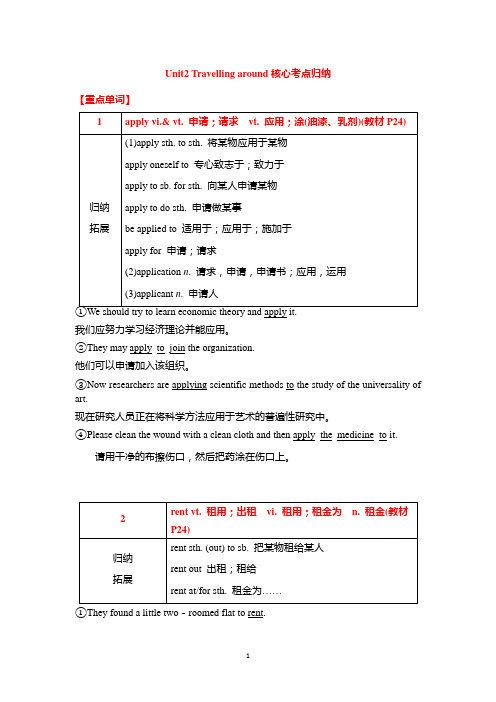
Unit2 Travelling around核心考点归纳【重点单词】We should try to learn economic theory and apply it.我们应努力学习经济理论并能应用。
②They may apply_to_join the organization.他们可以申请加入该组织。
③Now researchers are applying scientific methods to the study of the universality of art.现在研究人员正在将科学方法应用于艺术的普遍性研究中。
④Please clean the wound with a clean cloth and then apply_the_medicine_to it.请用干净的布擦伤口,然后把药涂在伤口上。
①They found a little two-roomed flat to rent.他们找到了一个出租的小两居室。
②The apartment rents_for $500 a month.这套房间每月租金为500美元。
③They actually moved down from upstairs because the rent was that expensive. 他们确实从楼上搬到了楼下,因为房租太贵了。
④We rented the villa to an American couple.我们将别墅出租给了一对美国夫妇。
I haven't packed my suitcase yet.我的行李箱还没收拾好呢。
②After dinner the customer packed_up the remains on the table.饭后,顾客把桌子上的剩饭打包了。
③He used to smoke a_pack_of cigarettes a day.过去他常常一天抽一包烟。
人教版高一英语必修一Unit2知识点详解
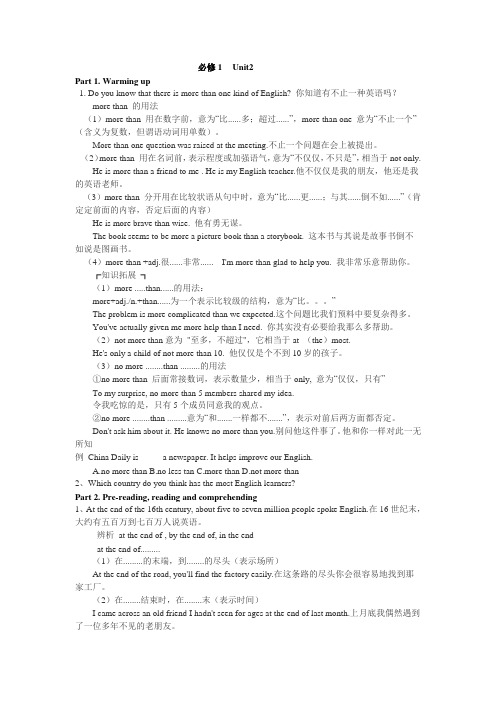
必修1 Unit2Part 1. Warming up1. Do you know that there is more than one kind of English? 你知道有不止一种英语吗?more than 的用法(1)more than 用在数字前,意为“比......多;超过......”,more than one 意为“不止一个”(含义为复数,但谓语动词用单数)。
More than one question was raised at the meeting.不止一个问题在会上被提出。
(2)more than 用在名词前,表示程度或加强语气,意为“不仅仅,不只是”,相当于not only.He is more than a friend to me . He is my English teacher.他不仅仅是我的朋友,他还是我的英语老师。
(3)more than 分开用在比较状语从句中时,意为“比......更......;与其......倒不如......”(肯定定前面的内容,否定后面的内容)He is more brave than wise. 他有勇无谋。
The book seems to be more a picture book than a storybook. 这本书与其说是故事书倒不如说是图画书。
(4)more than +adj.很......非常...... I'm more than glad to help you. 我非常乐意帮助你。
┏知识拓展┓(1)more .....than......的用法:more+adj./n.+than......为一个表示比较级的结构,意为“比。
”The problem is more complicated than we expected.这个问题比我们预料中要复杂得多。
You've actually given me more help than I need. 你其实没有必要给我那么多帮助。
高一英语必修一unit2知识点梳理
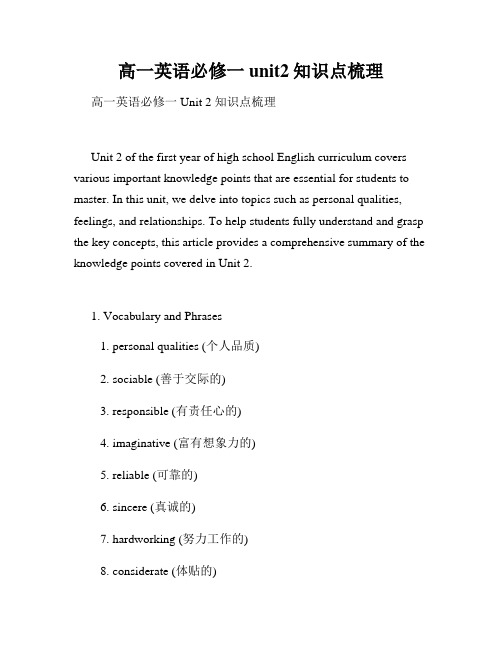
高一英语必修一unit2知识点梳理高一英语必修一Unit 2 知识点梳理Unit 2 of the first year of high school English curriculum covers various important knowledge points that are essential for students to master. In this unit, we delve into topics such as personal qualities, feelings, and relationships. To help students fully understand and grasp the key concepts, this article provides a comprehensive summary of the knowledge points covered in Unit 2.1. Vocabulary and Phrases1. personal qualities (个人品质)2. sociable (善于交际的)3. responsible (有责任心的)4. imaginative (富有想象力的)5. reliable (可靠的)6. sincere (真诚的)7. hardworking (努力工作的)8. considerate (体贴的)9. understanding (善解人意的)10. courageous (勇敢的)2. Grammar Points1. Comparative and superlative forms of adjectives (比较级和最高级形式的形容词)- Examples: "more sociable," "the most imaginative"2. Prepositional phrases of time and place (时间和地点的介词短语)- Examples: "on a sunny day," "at school"3. Verbs followed by gerunds or infinitives (动词+动名词或不定式)- Examples: "enjoy doing," "decide to do"3. Reading Comprehension1. Reading strategies (阅读策略)- Skimming and scanning- Understanding context clues2. Text analysis (文本分析)- Identifying main ideas and supporting details- Making inferences and predictions3. Vocabulary in context (上下文词汇理解)- Using context to determine meaning4. Writing Skills1. Descriptive writing (描写性写作)- Using adjectives and adverbs to create vivid descriptions- Organizing ideas and details logically5. Speaking and Listening1. Giving opinions and expressing agreement/disagreement (表达观点和赞同/不赞同)2. Effective communication strategies (有效的交流策略)- Active listening- Asking for clarification6. Cultural Awareness1. Understanding cultural differences (理解文化差异)- Personal qualities valued in different cultures- Etiquette and social normsBy reviewing and consolidating these knowledge points, students will be better prepared to understand and communicate effectively in English. It is essential to practice and apply these concepts in various contexts, both inside and outside the classroom, to enhance language proficiency.。
新外研版高中英语必修一Unit2ExploringEnglish知识点总结
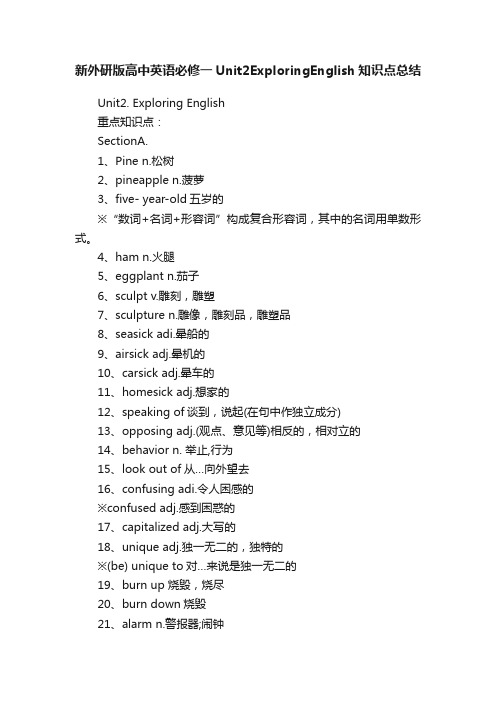
新外研版高中英语必修一Unit2ExploringEnglish知识点总结Unit2. Exploring English重点知识点:SectionA.1、Pine n.松树2、pineapple n.菠萝3、five- year-old五岁的※“数词+名词+形容词”构成复合形容词,其中的名词用单数形式。
4、ham n.火腿5、eggplant n.茄子6、sculpt v.雕刻,雕塑7、sculpture n.雕像,雕刻品,雕塑品8、seasick adi.晕船的9、airsick adj.晕机的10、carsick adj.晕车的11、homesick adj.想家的12、speaking of谈到,说起(在句中作独立成分)13、opposing adj.(观点、意见等)相反的,相对立的14、behavior n. 举止,行为15、look out of从…向外望去16、confusing adi.令人困感的※confused adj.感到困惑的17、capitalized adj.大写的18、unique adj.独一无二的,独特的※(be) unique to对…来说是独一无二的19、burn up 烧毁,烧尽20、burn down烧毁21、alarm n.警报器;闹钟22、go off(警报器等)突然发出巨响23、reflect v显示,反映24、creativity n.创造性,创造力25、visible adj.看得见的,可见的26、wind up给(机械)上发条;使(活动、会议等)结束原文长难句分析:1、Have you ever asked yourself why people often have trouble learning English?--- why引导宾语从句,作ask的宾语※have trouble(in) doing sth.做某事有困难2、Neither is there pine nor apple in pineapple.---“Neither/Nor+助动词/连系动词be/情态动词+另一主语表示上述否定情况也适用于该主语。
【高中英语教材知识梳理】必修一 Unit 2

Unit 2English around the worldⅠ.单词语境记忆1.command him to start at once 命令他立即动身2.recognize him as a pickpocket 认出他是小偷3.frequent cultural exchange 经常的文化交流4.her native language/tongue 她的母语5.go straight down the road 沿着这条路一直走6.master the usage of the words 掌握词的用法7.enlarge/expand your vocabulary扩大词汇量8.speak with a southern accent说话带有南方口音9.make an urgent request for international aid 紧急要求国际援助10.discover the identity of the baby 查明婴儿的身份Ⅱ.词性转换与派生记忆1.native adj.本国的;本地的→n.本地人;本国人2.base v t.以……为根据→n.基部;基地;基础3.actually ad v.实际上;事实上→actual adj.真实的;实际的4.latter adj.较后的;后半的;(两者中)后者的→latest adj.最新的;最近的→later adj.后期的;后者的→lately ad v.近来;最近5.fluent adj.流利的;流畅的→fluently ad v.流利地;流畅地→fluency n.流利;流畅6.expression n.词语;表示;表达→express v t.表达7.recognize v t.辨认出;承认;公认→recognition n.认出Ⅲ.单词趣味串记1.We’d better first fill the car up with petrol at the gas station.我们最好先到加油站去给汽车加满汽油。
- 1、下载文档前请自行甄别文档内容的完整性,平台不提供额外的编辑、内容补充、找答案等附加服务。
- 2、"仅部分预览"的文档,不可在线预览部分如存在完整性等问题,可反馈申请退款(可完整预览的文档不适用该条件!)。
- 3、如文档侵犯您的权益,请联系客服反馈,我们会尽快为您处理(人工客服工作时间:9:00-18:30)。
人教版高一英语必修一Unit2知识点梳理及练习1.official adj.官方的;正式的;公务的e.g. There will be an official inquiry into the matter.将对这件事进行正式调查。
【拓展】official 或officer两者都有官员的意思,但是所指不同。
official常指政府官员或行政官员officer常指身特定制服的官员,如军官或者警官等。
【练习】My father is an________ in the army, while his father is an________ in the government.2. voyage n.航行;航海;航天辨析:voyage/journey/travel/trip/tour1) voyage: 去国外或较远地方的海上旅行make a voyage 进行一次航行e.g. Columbus succeeded in making a voyage to America in 1942.2) journey: 指较远的从一地到另一地旅行,距离较远,多指陆地e.g. They will make a journey to Beijing by train.3) travel: 一系列的旅程,泛指旅游e.g. We had six days’ travel by car.4) trip: (短途)旅行 e.g. The Greens will take a weekend trip to the Great Wall.5) tour:为了公务、娱乐或教育参观多处名胜的旅行e.g. We will make a tour of Hainan next week.【练习】用上面所提供的辨析词的适当形式填空1). It is tiring to take a long _______ by train from Paris to Moscow.2). The _________ from England to Australia used to take several months.3). We’ll have time for a ______ to France next weekend.4). We went on a guided ______ round the castle.3. because of 因为;由于e.g. They are here because of us. 他们是因为我们来这里的。
[短语归纳] because of 是复合介词。
because 是从属连词,引导原因状语从句。
[练习] He came late to school again _______ he got up too late.The girl cried __________ what the teacher said.We have to cancel our trip _________ the bad weather.because of的近义词组因为;由于as a result of 由于…的原因by reason of 因为due to 因为,由于归功于…Thanks to his help, I finished the task on time.多亏了他的帮助,我按时完后了任务。
I had to stay at home due to the weather.由于天气原因我只能呆在家里。
4. native adj. 本国的;本土的n.本地人,本国人e.g. Finally, she returned to her native land.The panda is a native of China.熊猫原产于中国。
【注意】native 做形容词用时,只能做前置定语。
be native to 意为(动植物)是…特有的,原产于…e.g. The tiger is native to India.e up走近;上来;提出e.g. The little came up to the stranger and showed him how to get to the police station. [短语归纳] come across邂逅偶遇come about发生come at向…扑来,攻击come from 来自come out 出版;开花;结果是come up with想出come true实现come down下来;传承[练习] 用come构成的词组填空。
1). The hunter walked across the forest when suddenly a bear _______ him.2). The magazine __________ once a month.3). I wish you can ___________ to England on your holiday.4). The engineers has ______________ new ways of saving energy.5). They ___________ an old school friend in the street this morning.6. actually adv. 实际上;事实上(=in fact/ as a matter of fact)e.g. He looked calm, but actually he was very nervous.【其他】actually adv.居然;竟然e.g. He actually expected me to pay for the ticket.他竟然指望我给他付票钱。
actual adj. 实在的;实际的 e.g. What were his actual words? 他到底怎么说的?7. base vt. 以…为基础base sth on sth 以某事物为另一事物的根据或基础be based on 以…为基础e.g. One should always base one’s opinions on facts.The story is based on facts.n.基础;基地;an air base 空军基地8. at present现在,目前present n. 礼物adj. 在场的;目前的vt. 赠送e.g. The mountain bike is a birthday present from my parents.I am afraid I can’t help you at present.[重点用法] at present=at the present time=now 目前,现在be present at 出席;到场(反义:be absent from)present sb. with sth. = present sth. to sb.把某物送给某人【注意】present作为adj.“现在的;当前的”讲时,常做前置定语;而做“出席的,到场的”讲时,常做后置定语。
e.g. He doesn’t know how to deal with the present problem.The people present at the meeting are advanced workers.9. gradual adj.逐渐的,逐步的→gradually adv.逐渐地,逐步地e.g. Things gradually improved. 情况已经渐渐地改善。
This is a gradual change in his attitude towards his stepmother.10. especially/ speciallyespecially意思是“尤其,特别”,表达事物的不寻常或特别重要specially 指为了某一目的,专门做某事【练习】1). Our city is very beautiful, ___________ in spring.2). He came here ___________ to ask you for help.11. make use of利用;使用[短语归纳] use前可加形容词,表示不同程度的利用。
make good use of 好好利用make full use of 充分利用make the best/most of 充分利用use up 用尽,耗尽e.g. You are not making the best (use) of your talents.12. latter adj. 较后的;后半的;后者的e.g. She lived a hard life in the latter part of her life.【注意】the latter (已提到的两者中的)后者,通常与the former(前者)相对应They are two choices for us. Many boys support the farmer, but I favor the latter. 13. such as例如;像这种的辨析:such as/for example/that is/and so on(1)such as 用于列举事物时常放在所列举事物与前面的名词之间,且其后不用逗号,直接跟所列举的事物,可与like互换。
它所列举的事物的数量不能等同于前面所提的事物的总和,否则就用that is或namely。
(2)for example 主要用于举例说明,其前后多用符号隔开。
其位置比较灵活,可位于句首、句中或句末(such as只能位于所列举的事物之前)。
(3)that is 相当于namely,它所列举的事物的总量等于前面所提到的事物的总和。
(4)and so on 对几个事物进行列举时,在说了其中的几个以后,用...and so on 进行概括,说明还有例子,但不一一列出了。
【练习】(1)My daughter studies four subjects in school, ____________,Chinese, maths, English and P.E.(2)Overcooking(烹饪过度), ____________,destroys many nutrients(营养素).(3)He can speak some other languages, ____________ French and German.(4)There are some books, pens, erasers ____________ in my bag.14. frequent adj. 频繁的;常见的e.g. His visit became less frequent as time passed.frequently adv. 常常;频繁地Buses run frequently from the city to the airport. 公共汽车不断的从城市开往机场。
